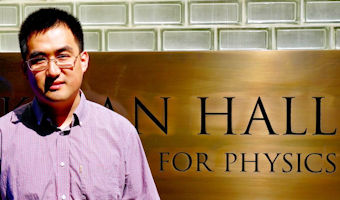The Institute of Nuclear and Particle Physics (INPP) presents Wei Li, of Rice University, on “Nearly “Perfect” Quark-Gluon Droplet at the Smallest Scales” on Tuesday, Feb. 6, at 4 p.m. in Edwards Accelerator Lab, Roger W. Finlay Conference Room.

Wei Li
Abstract: In high energy collisions of large, heavy nuclei (e.g., Au or Pb), a new state of matter consisting of liberated quarks and gluons is formed at a temperature of a few trillion Kelvins. This “Quark-Gluon Plasma” (QGP), discovered at the Relativistic Heavy Ion Collider (BNL) and the Large Hadron Collider (CERN, Switzerland), is found to exhibit amazing collective behavior as a nearly “perfect” fluid, which flows with close-to-zero viscous dissipation. It was thought that elementary collision systems like proton-proton (pp) or proton-nucleus (pA) are too small and dilute to form a QGP fluid so they were often treated as a reference in understanding the emergence of perfect fluidity in large heavy ion systems. Surprisingly, in recent years, evidence for collective effects and QGP formation has also been revealed in those smallest collisions, when looking at a fraction of rare events releasing largest number of particles.
In this talk, I will describe key findings related to the possible formation of the tiniest QGP fluid in pp and pA systems from the CMS experiment, and discuss their implications to the standard paradigm of heavy ion physics, as well as new opportunities opened up in studying emergent Quantum Chromodynamics phenomena under extreme conditions.



















Comments